I seem to spend a considerable amount of my life in supermarkets; probably because I can never decide what to buy. There seem to be too many choices! If you ever happen upon me in a supermarket, I’ll probably be in the breakfast cereal aisle pacing up and down, scrutinising different packets - completely unable to make a decision.
Do you ever struggle like me to make decisions when shopping? Perhaps it’s not the supermarket for you - maybe it’s choosing new shoes or what to wear in the morning; We all struggle with making decisions from time to time; This blog might shed some light on why you find it so hard. The last time I looked at whether we can really ever trust our memory. This is the second in a series on memory, and shows how memory affects our ability to make good decisions…
Facing a Supermarket Crisis
Standing in the supermarket, you are paralysed. You remember that you came into the supermarket to buy some more washing powder but now you are dumbstruck. Indecision fogs your thoughts as a dozen or more varieties of washing powder stare back at you.
‘Which should I choose?’ you ponder…
‘I could go for the cheapest, but the quality might not be so good. The ecologically friendly one might be a good choice? But then there also is that large packet that works out best value in the long run… Perhaps the one with the ‘super-cleaning-enzymes??? I just want some washing powder for crying out loud! Why are there so many choices?’
You’re an intelligent person and so you are trying to weigh up the pros and cons of each - but to be honest: you’re struggling.
Finally you grasp a packet in your (now sweaty) hands and head for the checkout. But you are left with that nagging thought ‘did I make the best decision? Maybe I should have gone for the ecologically friendly one after all!’
 Perhaps you don’t struggle with such issues. Maybe you have a tendency to forget important events (like a Birthdays or anniversaries). If so, then there’s a scientific reason for these things: you were programmed that way! It’s all to do with your memory, and like it or not, it is very limited:
Perhaps you don’t struggle with such issues. Maybe you have a tendency to forget important events (like a Birthdays or anniversaries). If so, then there’s a scientific reason for these things: you were programmed that way! It’s all to do with your memory, and like it or not, it is very limited:
Try a Memory Test
Have you ever played a ‘game’ where you are shown some objects on a tray for a few seconds and then they are covered up and you have to try and remember as many as possible? If you have, you’ll know how difficult keeping things in short-term memory can be - even things you’ve just seen!
Suppose someone read a list of 15 unrelated words to you (e.g. ‘egg’, ‘chair’, ‘interest’, ‘episode’, ‘moon’ …) how many do you think you could remember?
If you’ve never don it: try it now! (Click here to try out the word-list test online, but you have to register your email address to you it. If you have few more minutes, try the very good online BBC Memory Test.)
So how well did you do in the word-list test? I’m willing to bet you could remember about seven words. If you’re a real smarty-pants then you might have got nine or ten (you probably have a smug look on your face right now). On average though remembering seven different objects or words is the limit of the human mind.
The Magic Number Seven
In the 1950’s, a psychologist named George Miller discovered that our short term memory (called ‘working memory’) was limited to being able to store seven unique ‘things’ for a short period of time. Surprising isn’t it? He 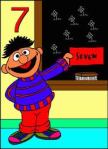 called this the ‘Magic Number Seven’. These ‘things’ could be words, objects or numbers. It’s probably for this reason that telephone numbers are normally only six or seven numbers long (not counting the area code). Because of this limit, when we are faced with apparently complex problems (like choosing which washing powder to buy) with several factors we find it nearly impossible to weigh them all up and come to a decision; basically you can’t think about them all at the same time!
called this the ‘Magic Number Seven’. These ‘things’ could be words, objects or numbers. It’s probably for this reason that telephone numbers are normally only six or seven numbers long (not counting the area code). Because of this limit, when we are faced with apparently complex problems (like choosing which washing powder to buy) with several factors we find it nearly impossible to weigh them all up and come to a decision; basically you can’t think about them all at the same time!
Decisions, decisions…
When we are faced with a decision that involves more than a few different factors (like deciding which car, house or washing powder to buy) it becomes increasingly impossible to work out the best solution because your ‘working memory’ is overwhelmed. The 11 billion nerve cells in your brain can’t seem to juggle all those different factors around at the same time. A computer could do the calculations in seconds (e.g. cost vs. quality, etc) but try as you might you end up frustrated and unable to make a decision (that’s me: procrastinating in the supermarket over there).
But there could be a solution to the problem; it involves relying on something that computers don’t have: intuition.
Top Trumps has the Answers!
You give one person a pile of ‘Top Trumps’ cards (say for cars) that have seven or more features on them (like fuel economy, top speed, price, acceleration, etc). They are asked to try to “work out” which is the best. Give them a few minutes to think it over.
At the same time, you give another person the same ‘Top Trumps’ cards and ask them to read them all and get them to pick which they “feel” is the best car out of all of them.
 In this situation the person who makes the best choice is nearly always the person who picks what they ‘feel’ is best. Why? It seems that when we are faced with difficult problems (and our ‘working memory’ is overwhelmed) the mind is still somehow able to weigh up the different pros and cons. This isn’t done as a conscious calculation (like 5×7=35) but processed on a deeper level and you get a ‘gut feeling’ about the best choice. Neurologists know that these deeper emotional feelings come from the ‘limbic’ part of our brain.
In this situation the person who makes the best choice is nearly always the person who picks what they ‘feel’ is best. Why? It seems that when we are faced with difficult problems (and our ‘working memory’ is overwhelmed) the mind is still somehow able to weigh up the different pros and cons. This isn’t done as a conscious calculation (like 5×7=35) but processed on a deeper level and you get a ‘gut feeling’ about the best choice. Neurologists know that these deeper emotional feelings come from the ‘limbic’ part of our brain.
So what’s the solution to your supermarket dilemmas? Answer: Stop thinking so hard! Don’t try to ‘work out’ the best choice; instead look at all the factors, then rely on your intuition to make the best decision. In situations where you don’t have time to write a full list of pros and cons on paper, it really does work!
Footnote: Improving your memory…
Ever hear about the man who could never forget? Is it possible to have a photographic memory? Do those brain-training games really work? Does TV and the internet make our memory worse? How can I improve my memory?
Stay tuned because I will be revisiting memory again in a blog in the not to distant future. Providing I don’t forget of course…





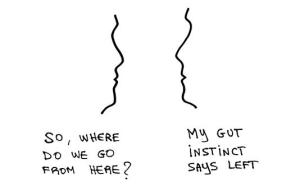
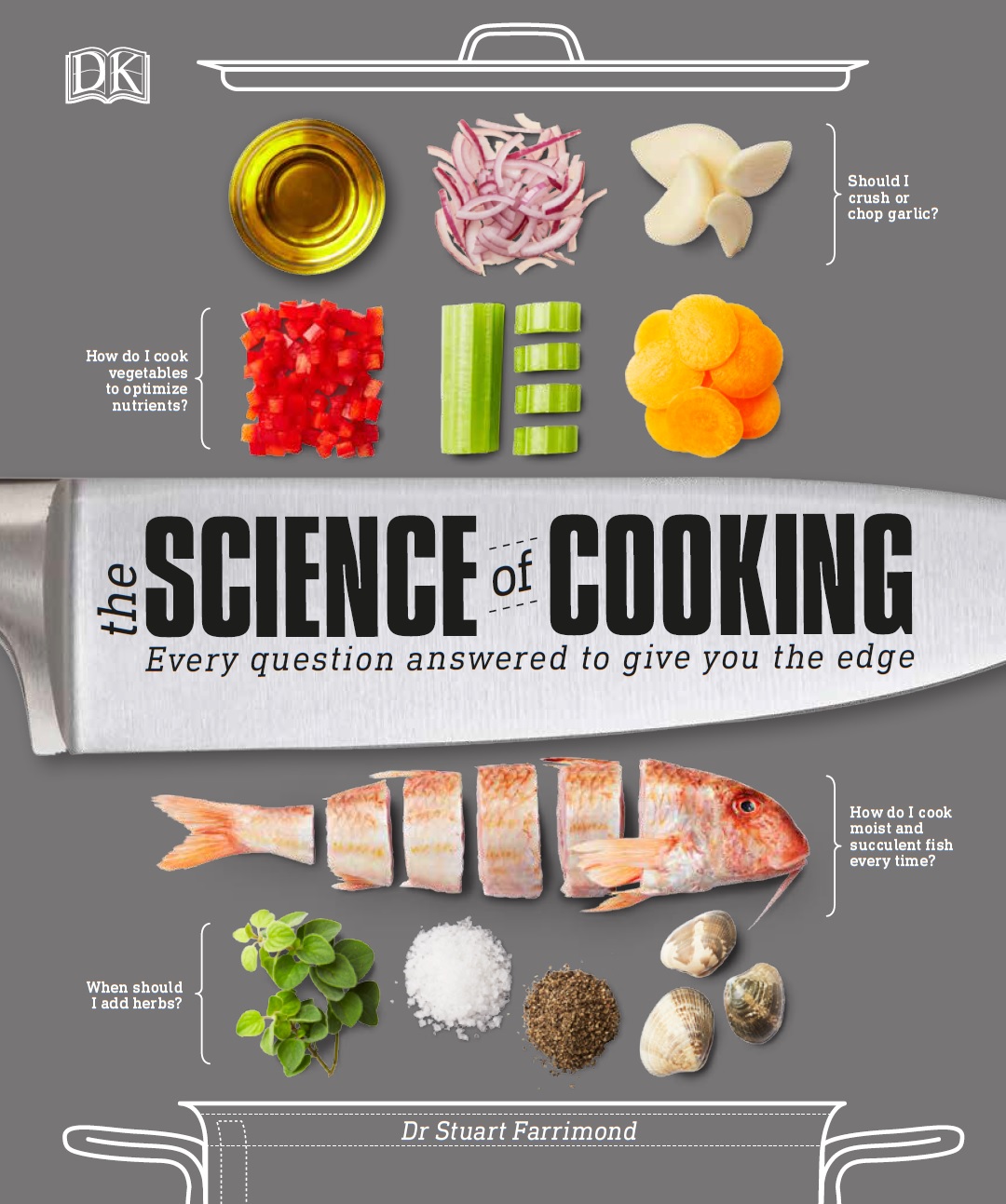




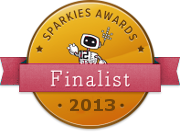


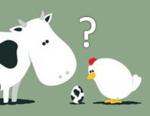
Looking forward to that next post! I remember Stephen Pinker wrote an article recently on the myth that video games and the internet get into our heads and are bad for us, kind of like “you are what you eat”. However I think Pinker missed the point that if we are clicking away on the internet, we are not -cultivating- discipline and patience (I say to myself, typing away)
Good information here about memory. I keep thinking about your point last time - that memory is spread throughout the brain. I use a trick in the supermarket that helps me remember dozens of things without a list - if I forget, I stand back and think about what has put me in a pissy mood that week - oops, the litter box is awful because I ran out this morning. And having to use scissors to cut open the last of the toothpaste - things that irritate me really don’t leave my memory very fast, and I always remember that stuff in the grocery store based on how black my mood is for missing the item that week.
I am almost never paralzyed in the store because I have a diet all worked out, plus I’m allergic to wheat so there’s all the choices gone, although it’s actually been a blessing. I also have the eco-friendly angle worked out quite well, so I’m lucky.
Posted by Emmi | September 23, 2010, 6:05 pmI shall look into Stephen Pinker’s claims…
Your solution to the supermarket problem has reminded me about something else about memory: all memories that are laid down in longer-term memory have associated emotions. In fact, it is extremely difficult to learn anything unless you are experiencing some form of emotion (either positive or negative). How much can you remember from school when the lessons were really dull? I bet that there are some school lessons that you can easily remember (because they had either a very good or very bad associated emotion). Revisiting that emotional state as a way of remembering what happened: I’d never thought of doing that!
That also reminds me: a professor Joe Forgas from Australia (http://forgas.socialpsychology.org/) has publshed lots of data suggesting that being grumpy helps you think more clearly and make better decisions!
Posted by Stuart Farrimond | September 23, 2010, 8:22 pmHere is the NY Times article so you don’t have to search for it http://www.nytimes.com/2010/06/11/opinion/11Pinker.html
Being grumpy helps us make better decisions? Haa, I’m totally going to use that! Thank you. Also re: grocery shopping, the other trick I use is I go room to room and think about something that was annoying: had to wash my hands with a soap I didn’t like, no milk for cereal, etc. That was part of the list. And yes - in grad school, I do remember sections of class with strong emotions. My most serious mistakes, when pointed out by a fellow scientist / peer or professor, let me tell you, I have no problem remembering those concepts today!
Posted by Emmi | September 23, 2010, 11:59 pmI remember a London taxi driver who told me what he had to remember in order to pass his taxi driver exams. He told me about the thousands of different locations that he had to know and he had to be able to know the fastest route between each one. He told me that he had a ‘map’ in his head and boasted that he would know the fastest way to get from one place to another.
In terms of memory, us humans have a pretty advanced ‘declarative’ memory: this is in the bit of the brain called the ‘hippocampus’ where we can store a ‘mental map’ of places (thought to originally be used so we would know our territory well). We can tap into this part of our brain to improve our memory or aid our recall (as you do!).
Such ‘visualisation’ techniques are how many experts can do amazing memory feats (like remembering the sequence of a pack of cards): http://www.tellmehowto.net/howto/remember_cards_4360
Posted by Stuart Farrimond | September 24, 2010, 7:01 amThanks for the link by the way!
Posted by Stuart Farrimond | September 24, 2010, 7:01 amThank you for the Decisions, Decisions article. I have always had difficulty with deciding until the last couple of years and started doing the ‘gut instinct’ thing and it works - but now I know why.
Posted by Ann-Marie Glenn | September 24, 2010, 7:24 amGlad to help!!
Posted by Stuart Farrimond | September 24, 2010, 7:29 am